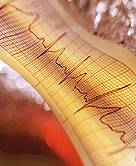
TUESDAY, Jan. 29 (HealthDay News) — Doctors should look more closely at the overall health of impotent men, a large new study suggests.
Men with even mild erectile dysfunction — but no known heart problems — face a major extra risk of developing cardiovascular conditions in the future. And as erectile dysfunction becomes more pronounced, signs of hidden heart disease and earlier death risk grow.
Not surprisingly, men already known to have a heart condition along with severe erectile dysfunction fare worst of all, the Australian researchers found.
Among men aged 45 and up without diagnosed heart disease, those with moderate or severe erectile dysfunction were up to 50 percent more likely to be hospitalized for heart problems, according to an adjusted analysis. Erectile dysfunction boosted the risk for hospitalization even more when men had a history of cardiovascular disease.
Erectile problems, which become more likely as men grow older, aren’t a guarantee of heart problems. Still, men with erectile dysfunction should “take action by seeing a health professional and asking for a heart check,” said study lead author Dr. Emily Banks. “Men with erectile dysfunction need to be assessed for their future risk of cardiovascular disease, and any identified risk must be managed appropriately.”
Banks is a professor of epidemiology at the Australian National University’s National Center for Epidemiology and Population Health.
Banks said an estimated 60 percent of men aged 70 and up suffer from moderate to severe erectile dysfunction. The condition can place major limits on sexual activity and require the use of drugs like Viagra that can come with side effects and awkward challenges when it comes to the timing of doses.
A variety of causes can contribute to impotence, but “it is widely acknowledged that erectile dysfunction is predominantly the result of underlying cardiovascular disease,” Banks said.
Doctors already believe that erectile dysfunction is an early warning sign of heart problems, but it’s not clear why. It’s possible, Banks said, that the arteries of the penis are smaller than those of other parts of the body and may be more likely to reveal problems when their lining deteriorates.
The new study aims to gain more insight into how the severity of erectile dysfunction translates into a higher risk of cardiovascular disease. The researchers tracked more than 95,000 men aged 45 and up, and compared data collected between 2006 and 2009 to data collected in 2010.
The researchers adjusted their statistics so they wouldn’t be thrown off by factors like high or low numbers of men who smoked or drank alcohol, or were wealthy or poor. They found that the men with severe erectile dysfunction, compared to those with no problem, were eight times more likely to have heart failure, 60 percent more likely to have heart disease and almost twice as likely to die of any cause.
What does this mean in the big picture?
“Heart problems are very common, so even a relatively moderate increase in risk translates into quite a number of affected individuals,” Banks said. “Among men with no past history of cardiovascular disease, an estimated six per 1,000 men per year who did not have erectile dysfunction went on to be admitted to the hospital for coronary heart disease. This compares with eight per 1,000 men per year with moderate erectile dysfunction and nine per 1,000 men per year among those with severe erectile dysfunction.”
Also, she said, “among men with a past history of cardiovascular disease, an estimated 20 per 1,000 men per year of those without erectile dysfunction went on to be admitted to the hospital for coronary artery disease. This compares with 28 per 1,000 men per year with moderate erectile dysfunction and 34 per 1,000 men per year with severe erectile dysfunction.”
Could drugs for erectile dysfunction, such as Viagra, actually help men with undiagnosed heart problems? Maybe.
“Medications to treat erectile dysfunction have proven benefits in treating [lung] hypertension and are being evaluated as a treatment for heart failure,” said Dr. Gregg Fonarow, a professor of cardiology at the University of California, Los Angeles. “However, there are no proven benefits for reducing the risk of heart attack or stroke.”
Fonarow agreed with the study’s conclusion that men with erectile dysfunction should get their hearts checked, especially since cardiovascular disease can have no symptoms.
The study authors said, however, that more research is needed before the presence of erectile dysfunction can be considered a clinical predictor of heart disease risk.
The study appears in the January issue of the journal PLoS Medicine.
More information
For more about erectile dysfunction, try the U.S. National Library of Medicine.

